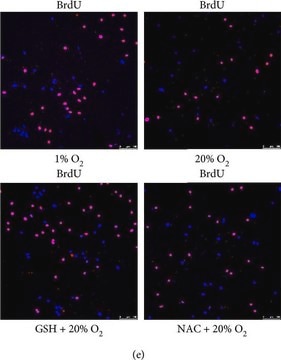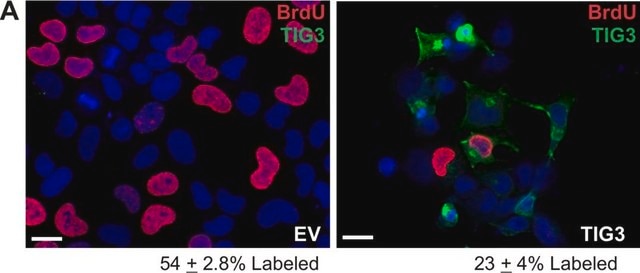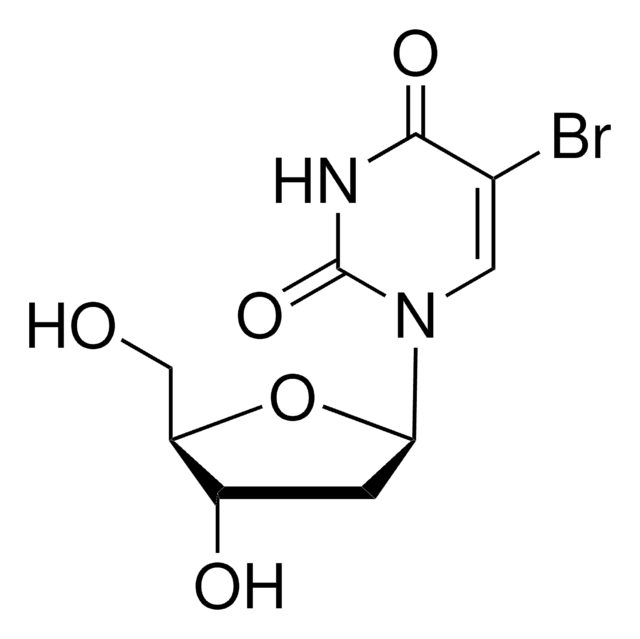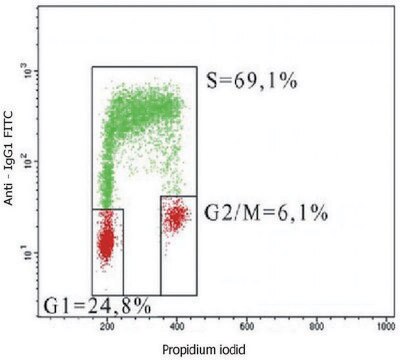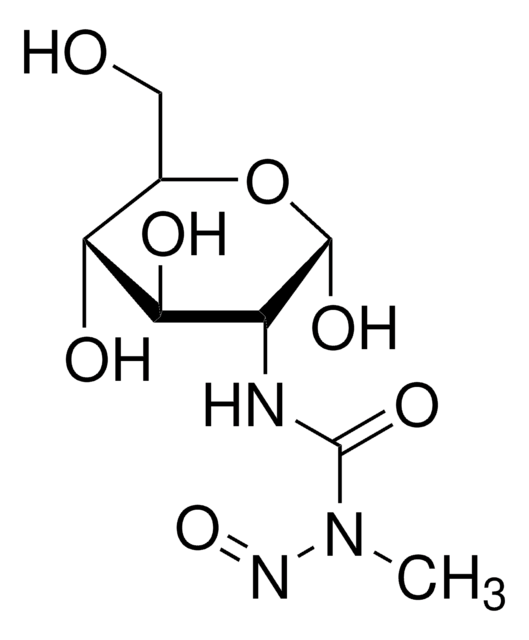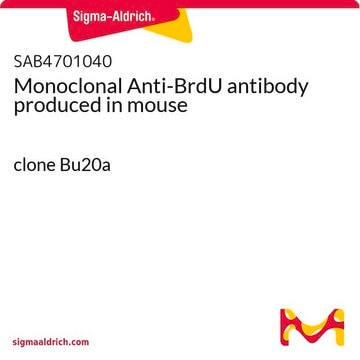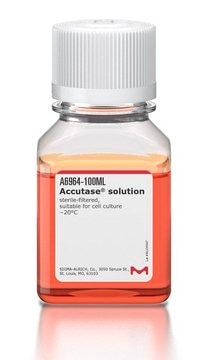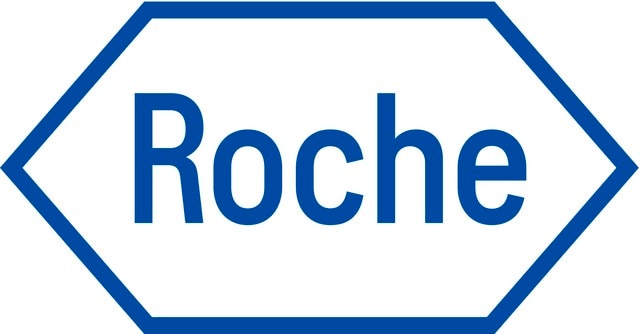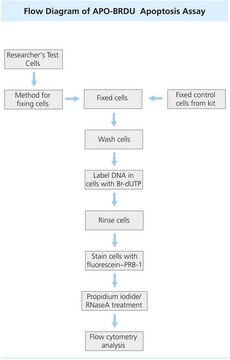MAB4072
Anti-BrdU Antibody, clone 131-14871
clone 131-14871, Chemicon®, from mouse
Synonym(s):
BrdU
About This Item
Recommended Products
biological source
mouse
Quality Level
antibody form
purified immunoglobulin
antibody product type
primary antibodies
clone
131-14871, monoclonal
species reactivity (predicted by homology)
all
manufacturer/tradename
Chemicon®
technique(s)
flow cytometry: suitable
immunohistochemistry (formalin-fixed, paraffin-embedded sections): suitable
isotype
IgG1
shipped in
wet ice
target post-translational modification
unmodified
Related Categories
General description
Specificity
Application
Flow cytometry on 100μL of 106 cells: 1:5000.
Optimal dilutions must be determined by the end user.
IMMUNOHISTOCHEMICAL PROCEDURE
FOR PARAFFIN EMBEDDED TISSUE SECTIONS
STAINING PROCEDURE:
1. Deparaffinize sections in xylene 3 x 5 minutes. Resin embedded or GMA (Glycol methacrylate, 2-hydroxyethyl methacrylate) treated sections it is unnecessary to deparaffinize as there is no paraffin.
2. Place slides in graded alcohols (100, 95, 90%) to water at 2 minute intervals, and air dry. (Omit for GMA sections)
3. Circle sections with PAP pen or diamond pen to identify and dry thoroughly.
4. For GMA or resin sections, place slides in 0.5% Tween/PBS (pH 7.6) for 29 minutes.
5. Incubate in prewarmed (40°C) 1N HCl for 1 hour.
6. Wash 3 x 3 minutes with PBS (pH 7.6). Slides may be held at this point and the procedure continued the following day.
7. Incubate in 1X Trypsin solution (0.02-0.05% w/v, prewarmed to 40°C) for 20 minutes at room temperature for NBF (normal buffered formalin) fixed tissue or 10 minutes for Carnoy′s fixed tissue.
8. Wash 3 x 5 minutes with PBS (pH 7.6).
9. Incubate sections in 1% H2O2 (10 mL 30% H2O2 in 290 mL methanol) for 20 minutes, or GMA sections in 3% H2O2 (10 mL 30% H2O2 in 90 mL water) for 3 minutes.
10. Wash 2 x 2 minutes with PBS (pH 7.6).
11. Using the Vector ABC kit, add 3 drops of normal horse serum to 10 mL of PBS. Use this solution to block the slides for 20 minutes at room temperature.
12. Blot the slides of excess normal horse serum and incubate with MAB4072 diluted in PBS/BSA/Tween 20 for 1 hour at room temperature.
13. Wash 3 x 3 minutes with PBS (pH 7.6).
14. Add 3 drops of normal horse serum to 10 mL of PBS and then add 1 drop of biotinylated antibody stock. Incubate the slides with this diluted second antibody for 30 minutes at room temperature.
15. Prepare the Vectastain ABC Reagent by adding 2 drops of reagent A to 5 mL of PBS. Then add 2 drops of Reagent B to the same mixing bottle. Allow to sit for about 30 minutes prior to use.
16. Wash 3 x 3 minutes with PBS (pH 7.6).
17. Incubate the slides with ABC Reagent for 30 minutes at room temperature.
18. Wash 3 x 3 minutes with PBS (pH 7.6).
19. Prepare the substrate by mixing an equal volume of 0.02% H2O2 (made in distilled water from a 30% stock solution) and 0.1% DAB made in 0.1 M Tris buffer, pH 7.2. The H2O2 should be freshly prepared from concentrated stock. Because many peroxide substrates are unstable in the presence of H2O2 or when exposed to light, the substrate should be prepared just prior to use. Since DAB is a suspected carcinogen, care should be taken in handling and disposing of all peroxidase substrates.
20. Stain the slides with DAB substrate for 2-5 minutes.
21. Wash 2 x 2 minutes with distilled water.
22. Counterstain with hemotoxylin, dehydrate through xylene, and mount the coverslip.
Epigenetics & Nuclear Function
Cell Cycle, DNA Replication & Repair
Physical form
Storage and Stability
Analysis Note
Brdu treated cells
Other Notes
Legal Information
Disclaimer
Not finding the right product?
Try our Product Selector Tool.
wgk_germany
WGK 2
flash_point_f
Not applicable
flash_point_c
Not applicable
Certificates of Analysis (COA)
Search for Certificates of Analysis (COA) by entering the products Lot/Batch Number. Lot and Batch Numbers can be found on a product’s label following the words ‘Lot’ or ‘Batch’.
Already Own This Product?
Find documentation for the products that you have recently purchased in the Document Library.
Customers Also Viewed
Our team of scientists has experience in all areas of research including Life Science, Material Science, Chemical Synthesis, Chromatography, Analytical and many others.
Contact Technical Service